The benefits of hiking are numerous, physically, mentally and emotionally. Of course, many people go outdoors, usually to a lake area or a large park, specifically to “get away” from their regular routine. This is where the mental and emotional benefits come in. This simple activity has been shown to help people who feel depressed, even suicidal, just because of the change in scenery and the change from the routine.
But be careful when you start hiking. You may find yourself becoming less depressed and happier, which could lead to a regular alteration in your lifestyle. Being outside, with the trees and animals, and being in the quiet setting, delivers you from the chaos you experience in your life every day. It takes you away from the demands and confusion of technology and allows you to understand your feelings and emotions without interruption.
A hike of 30 minutes or an hour, without music coming through the headphones, can be one of the most peaceful activities you’ll ever be involved in. You’ll get a sense of well-being that’s nearly impossible in the fast-paced world. If you enjoy sharing this with another individual, by all means do so. But be sure this person is hiking for the same reasons you are – to benefit from being outdoors.
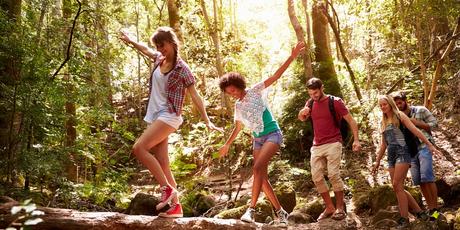
Physical Benefits
It’s obvious, isn’t it? Hiking is exercise and will deliver physical benefits, even beyond what you would get from walking in your neighborhood or park. But to make sure you get those benefits and nothing negative, such as leg or back pain, it’s important to start your hiking activity with a good pair of hiking boots or shoes.
When you start your search, make sure you look for quality, leather uppers, rubber soles or soles with plenty of “lugs” to get a good grip, and height to provide the support you’ll need for your ankles. In fact, if you’re planning to hike as a regular activity, two or more times a week, you’d be better off spending a bit of extra money for good boots. You’ll be glad you did.
With this advice to get you started, it’s a good time to consider the benefits of hiking topping almost everyone’s list. You’ve already read a bit about the mental and emotional effects from being outdoors. These are just as important as the physical results, especially in this fast-paced, confusing world. But when you exercise on a regular basis you are also countering the effects of riding in a car too often instead of walking, as well as the effects of eating food-like products instead of natural foods.
Fitness, Control
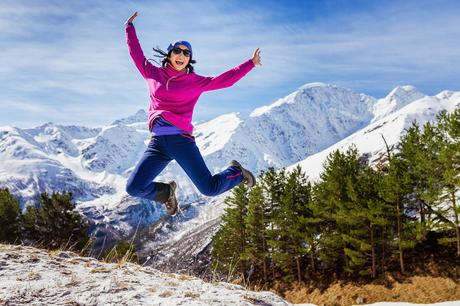
To put this in basic numbers, studies have shown hiking for one hour can burn 500 calories. Of course, the actual effect depends on the terrain you’re on. If you carry a backpack or any other weight, and hike where there are hills you’ll burn more calories. It’s best to take your activity to hiking trails, rather than just walking on concrete or asphalt. This may seem easier, but the truth is natural ground is going to be easier on your feet and ankles, not to mention your legs and back.
As you think about hiking, consider not just the small number of calories you can burn, but also consider the idea that you can lose weight with this activity. Combine hiking with a few changes in your diet, add a couple of glasses of fresh, clean water to your intake, and you are on the path to better health. But there’s a lot more to the benefits of hiking than losing a few pounds. When you hike you can plan your direction and destination, rather than engaging in repetitive exercise in a gym.
Of course, there’s nothing wrong with including regular, structured exercise in your routine. Combine hiking and workouts to get maximum results. However, with hiking you can see the gorgeous landscape, breathe fresh, outdoor air, and maybe even find your way up a mountain you would have never attempted before. Hiking can be fun at several levels: a walk in the woods, a trail hike through the trees, or a long-distance hike with backpack and camping.
Toning, Blood Pressure

Whole-body toning is one general benefit you’ll get from hiking, which isn’t usually delivered by machine-based workouts or weight lifting. You’re behind will become tighter and shapely, your calf muscles will strengthen and tighten up, and you can build your upper body as well, especially if you carry a pack with the day’s essentials.
Medical research has also shown hiking is a great way to keep blood pressure under control, even lower it a bit. If you’re struggling with high cholesterol numbers, regular hiking can also help with this condition. Of course, you should always stay within your limits as far as testing the body. If you have any doubts about this, you may want to consult with your doctor. Chances are he or she will encourage you to start hiking in moderate conditions and build up to something more strenuous.
People with diabetes may also find they get significant benefits from hiking in the great outdoors. Regular exercise can lower the level of blood sugar. Not only that, but hiking gives most of the bodies muscles a consistent workout, using blood sugar to produce the energy you need. Even if you’re hiking downhill you will be helping to remove blood sugars from the body. This is important for those who may be prone to heart disease and stroke. Again, you may want to talk to your doctor to determine just how and when you should start.
Healing Powers
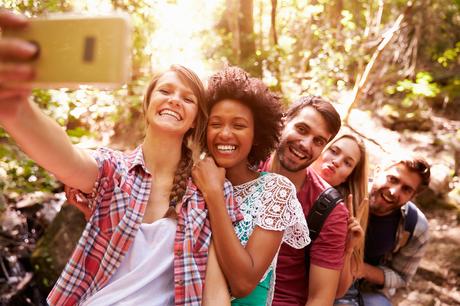
You’ve read a bit about the mental and emotional effects of being active outdoors, but did you realize regular activity like this may also help with healing some conditions. Research in the past few years has started to show the benefits extend beyond the effects mentioned and may actually help people with cancer recover more quickly and more efficiently.
Long-distance hikes may help fight off disease, increasing the anti-oxidant capabilities of the human body. It’s also been shown that hiking is an excellent activity in combination with the newest medical treatments offered.
Apart from these important benefits, hiking can produce some unexpected results, especially if you include a good friend or two. Planning a weekend hike or a trip over a longer distance is a great way to put new social activity on your calendar. One pair of retired ladies recently stated they drive to the lake a couple of times each week (7 miles) park at the concession area and walk the shoreline on trails for a couple of hours. This has rekindled the friendship they had in their youth and has proven to be a great way to get needed exercise.
Creative Urges

Taking the idea of hiking and being outdoors to another level altogether, some individuals have combined this activity with their creative side, re-starting their photography hobby or carrying a pair of binoculars for bird-watching. Not only does the physical exercise improve their health, these individuals have found their mental sharpness improvise.
They literally get away from technology, the Internet, the office etc. and begin to use their brain, unimpeded by man-made “things.” In addition, these individuals say they learn more about nature because they’re experiencing the scenery, the sounds and the smells of nature, which they had lost track of in their busy lives.
To summarize a bit, you can receive numerous benefits from hiking. You may lower your blood pressure, keep blood-sugar levels under control, lower the risk of heart disease with regular exercise, and strengthen muscles in the legs and lower back. Your overall balance may improve because of the regular use of muscles and joints, you can lose weight and your general mood will improve.
More Vigorous Hiking
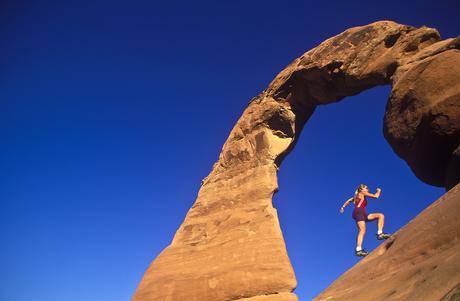
Now that you understand what even a moderate hiking routine can do for you, what can you do to increase the benefits with something more vigorous? As mentioned earlier, be sure to start with moderate hiking on easier trails, and don’t push yourself beyond the limits of your current condition. If you have medical conditions that may be a concern, talk with your physician first.
You can gradually work up to trails that challenge you with hills or uneven terrain. It’s best not to start at this level. Many people won’t hike without a solid walking stick, preferably one made of quality hard wood. The length will be a personal preference, of course, but make sure your stick is not too short. You should be able to grip it comfortably with your hand at about chest height.
If you’re not sure how to step-up the intensity of your hiking, take a few minutes to look at websites maintained by state agencies in natural resources or sites offered by hiking clubs. These sites will often list locations with suitable inclines on their trails, and you’ll also find some of the most beautiful places on the planet when you seek out good hiking terrain. You’ll improve your stamina and balance with a slightly more challenging location as well.
Weight and Schedule
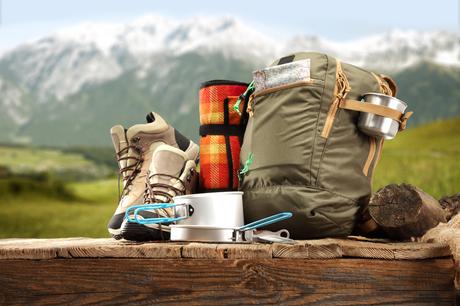
You will burn more calories when you carry a light backpack on your hike. Include water and a snack if you’re going out for even half a day. You’ll burn those calories and strengthen back and leg muscles in the process. Of course, if you’re going to be far from “civilization” you may want to have a friend along for the sake of safety and companionship. This is not absolutely necessary but it’s a precaution you should give some thought to.
You should also be familiar with the area in which you’ll hike. Use those websites mentioned earlier and get your hands on a trail map if at all possible. Keep checking on the weather conditions, right up to the time you leave. This will help you pack the right gear. If the weather is not cooperating when you arrive at the starting point, don’t take chances with lightning and rain. Of course, you should always follow marked trails and walking paths to be safe.
You don’t have to head to the Rocky Mountains and challenge yourself in dangerous situations to get the benefits. In fact, you don’t even have to brave hundreds of miles on the Appalachian Trail. Just find a great outdoor spot and enjoy the air, the scenery and the activity.
For years, medical research has shown hiking or some form of regular exercise improves your general health and improves your fitness. But it also adds significantly to the quality of life, with noticeable improvement in mental and emotional health. When you hike in the great outdoors on a regular basis you may find you’ll be less anxious and less depressed. It’s a low-impact sport producing extraordinary benefits. Try it. You’ll be glad you did.

